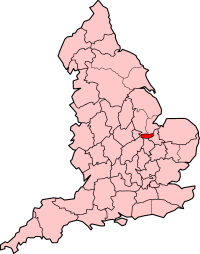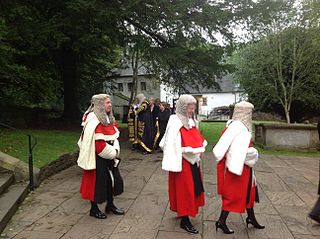
The Court of Chancery was a court of equity in England and Wales that followed a set of loose rules to avoid a slow pace of change and possible harshness of the common law. The Chancery had jurisdiction over all matters of equity, including trusts, land law, the estates of lunatics and the guardianship of infants.

The Lord Chancellor, formally titled Lord High Chancellor of Great Britain, is the highest-ranking traditional minister among the Great Officers of State in Scotland and England in the United Kingdom, nominally outranking the prime minister. The lord chancellor is appointed by the sovereign on the advice of the prime minister. Prior to the union of England and Scotland into the Kingdom of Great Britain, there were separate lord chancellors for the Kingdom of England and the Kingdom of Scotland. There were Lord Chancellors of Ireland until 1922.
The Courts of England and Wales, supported administratively by His Majesty's Courts and Tribunals Service, are the civil and criminal courts responsible for the administration of justice in England and Wales.

The Soke of Peterborough was a historic area of England associated with the City and Diocese of Peterborough. It was part of Northamptonshire, but was administered by its own county council, whilst the rest of Northamptonshire was administered by Northamptonshire County Council. The Soke was also described as the Liberty of Peterborough, or as the Nassaburgh hundred, and comprised, besides Peterborough, about thirty parishes. The Soke was abolished in 1965.

The Crown Court is the criminal court of first instance in England and Wales responsible for hearing all indictable offences, some either way offences and appeals of the decisions of magistrates' courts. It is one of three Senior Courts of England and Wales.
Circuit courts are court systems in several common law jurisdictions. It may refer to:

The Constitutional Reform Act 2005 is an Act of the Parliament of the United Kingdom, relevant to UK constitutional law. It provides for a Supreme Court of the United Kingdom to take over the previous appellate jurisdiction of the Law Lords as well as some powers of the Judicial Committee of the Privy Council, and removed the functions of Speaker of the House of Lords and Head of the Judiciary of England and Wales from the office of Lord Chancellor.
A recorder is a judicial officer in England and Wales and some other common law jurisdictions.

There are various levels of judiciary in England and Wales—different types of courts have different styles of judges. They also form a strict hierarchy of importance, in line with the order of the courts in which they sit, so that judges of the Court of Appeal of England and Wales are given more weight than district judges sitting in county courts and magistrates' courts. On 1 April 2020 there were 3,174 judges in post in England and Wales. Some judges with United Kingdom-wide jurisdiction also sit in England and Wales, particularly Justices of the United Kingdom Supreme Court and members of the tribunals judiciary.

A justice of the High Court, commonly known as a High Court judge, is a judge of the High Court of Justice of England and Wales, and represents the third-highest level of judge in the courts of England and Wales. High Court judges are referred to as puisne justices and wear red and black robes.
Sir Robert Andrew Morritt, CVO, is a former British judge who served as Chancellor of the High Court of England and Wales.
The recorder of London is an ancient legal office in the City of London. The recorder of London is the senior circuit judge at the Central Criminal Court, hearing trials of criminal offences. The recorder is appointed by the Crown on the recommendation of the City of London Corporation with the concurrence of the Lord Chancellor. The recorder's deputy is the Common Serjeant of London, appointed by the Crown on the recommendation of the Lord Chancellor. The recorder of London is, since 14 April 2020, Mark Lucraft.

The President of the Supreme Court of the United Kingdom is equivalent to the now-defunct position of Senior Lord of Appeal in Ordinary, also known as the Senior Law Lord, who was the highest ranking among the Lords of Appeal in Ordinary. The President is not the most senior judge of the judiciary in England and Wales; that position belongs to the Lord Chief Justice. The current President is Robert Reed, since 13 January 2020.

The Vice-Chancellor of the County Palatine of Lancaster is an office of the Duchy of Lancaster. The vice-chancellor is appointed by the Chancellor of the Duchy of Lancaster after consultation with the Lord High Chancellor of Great Britain. Since 1987, the vice-chancellor has been a High Court judge of the Chancery Division with a term of approximately three years.

The Courts and Legal Services Act 1990 was an Act of the Parliament of the United Kingdom that reformed the legal profession and courts of England and Wales. The Act was the culmination of a series of reports and reforms that started with the Benson Commission in the 1970s, and significantly changed the way that the legal profession and court system worked.

The assizes, or courts of assize, were periodic courts held around England and Wales until 1972, when together with the quarter sessions they were abolished by the Courts Act 1971 and replaced by a single permanent Crown Court. The assizes exercised both civil and criminal jurisdiction, though most of their work was on the criminal side. The assizes heard the most serious cases, most notably those subject to capital punishment or, later, life imprisonment. Other serious cases were dealt with by the quarter sessions, while the more minor offences were dealt with summarily by justices of the peace in petty sessions.

The Chancery Amendment Act 1858 also known as Lord Cairns' Act after Sir Hugh Cairns, was an Act of the Parliament of the United Kingdom that allowed the English Court of Chancery, the Irish Chancery and the Chancery Court of the County Palatine of Lancaster to award damages, in addition to their previous function of awarding injunctions and specific performance. The Act also made several procedural changes to the Chancery courts, most notably allowing them to call a jury, and allowed the Lord Chancellor to amend the practice regulations of the courts. By allowing the Chancery courts to award damages it narrowed the gap between the common law and equity courts and accelerated the passing of the Judicature Act 1873, and for that reason has been described by Ernest Pollock as "prophetic".

The Judges' Council is a body in England and Wales that, representing the judiciary, advises the Lord Chief Justice on judicial matters. It has its historical roots in the original Council of the Judges of the Supreme Court, created by the Judicature Act 1873 to oversee the new Supreme Court of Judicature. This body initially met regularly, reforming the procedure used by the circuit courts, and the new High Court of Justice but met less regularly as time went on, meeting only twice between 1900 and 1907, with a gap of ten years between meetings in 1940 and 1950 respectively. After relative inactivity, it was eventually wound up through the Supreme Court Act 1981, which contained no provisions for its continued existence, something Denis Dobson attributes to newer bodies which performed the duties the Council had originally been created to do.

The High Court of Justice in London, known properly as His Majesty's High Court of Justice in England, together with the Court of Appeal and the Crown Court, are the Senior Courts of England and Wales. Its name is abbreviated as EWHC for legal citation purposes.
Certain former courts of England and Wales have been abolished or merged into or with other courts, and certain other courts of England and Wales have fallen into disuse.










